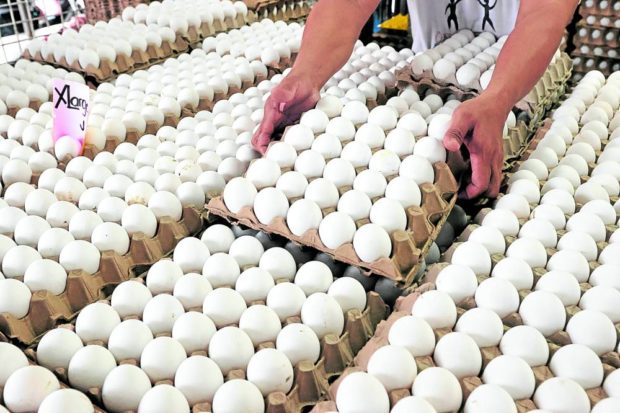
A vendor mans his store which is selling eggs in Tondo, Manila. —GRIG C. MONTEGRANDE
The Department of Agriculture (DA) is backing certain projects aimed at strengthening the egg value chain to ensure a stable egg supply and address challenges including high production costs.
The DA issued Memorandum Circular No. 36 outlining the guidelines for implementing egg industry development projects this year focusing on value-adding projects.
Such projects, involving storage, processing, marketing and waste management solutions, seek to address sustainability in the layer industry.
READ: DA calls on public to eat more eggs to curb oversupply
“The Philippines is self-sufficient in eggs but is vulnerable due to various factors such as high production costs, limited post-production capacity, high import dependency, and fluctuating prices,” the memo dated Sept. 6 read.
“To sustain the growth of the layer industry and ensure stable supply of eggs, it is important to provide proper support for modernization initiatives to enhance productivity, income generation, and biosecurity measures among layer farmers,” it added.
The project has four components: egg cold and dry warehouse, egg processing facility, market support to small-scale egg producers and manure composting.
According to the DA memo, an egg cold storage and dry warehouse would prolong eggs’ shelf life and help stabilize supply and demand.
For the processing facility, a grant of P80 million will be given to large egg production areas in Batangas, Bulacan and key areas in Visayas and Mindanao.
Such facilities are designed to bolster egg production and supply nutritious food products to the government and Filipino consumers in general.
The DA will prioritize areas with significant local egg-producing industry in providing logistic support and market linkages to eliminate the disadvantages of the trader in the current system.
“This will ensure equitable price and income among the producers and affordable and safe eggs for the consumers,” it said.
The agency will also offer a grant of P30 million for projects that will convert animal manure and other farm/ crop wastes into natural or organic fertilizer, starting with peri-urban areas such as Rizal.
The grant “will help in a way minimize if not eradicate animal disease, control air, and water pollution, improve soil conditions, and increase farmers’ income,” it added.
Interested entities may apply for the project and submit the requirements, including letter of intent, proof of land ownership, proof of existing egg enterprise/farm/business, project concept note or proposal, and program of works and design.
The country’s chicken egg production totaled 731,361.8 metric tons in 2023, up by 3.2 percent from 708,499.6 metric tons (MT) a year ago, data from the Philippine Statistics Authority (PSA) showed.
In the April to June period, chicken egg output rose by 9 percent to 198,044.8 MT from 181,740.2 MT.
In Metro Manila, a medium-sized chicken egg retailed from P7.75 to P8.50 each as of Monday, higher than last year’s price of P6.20 to P8.50 apiece, according to the DA’s price monitoring.